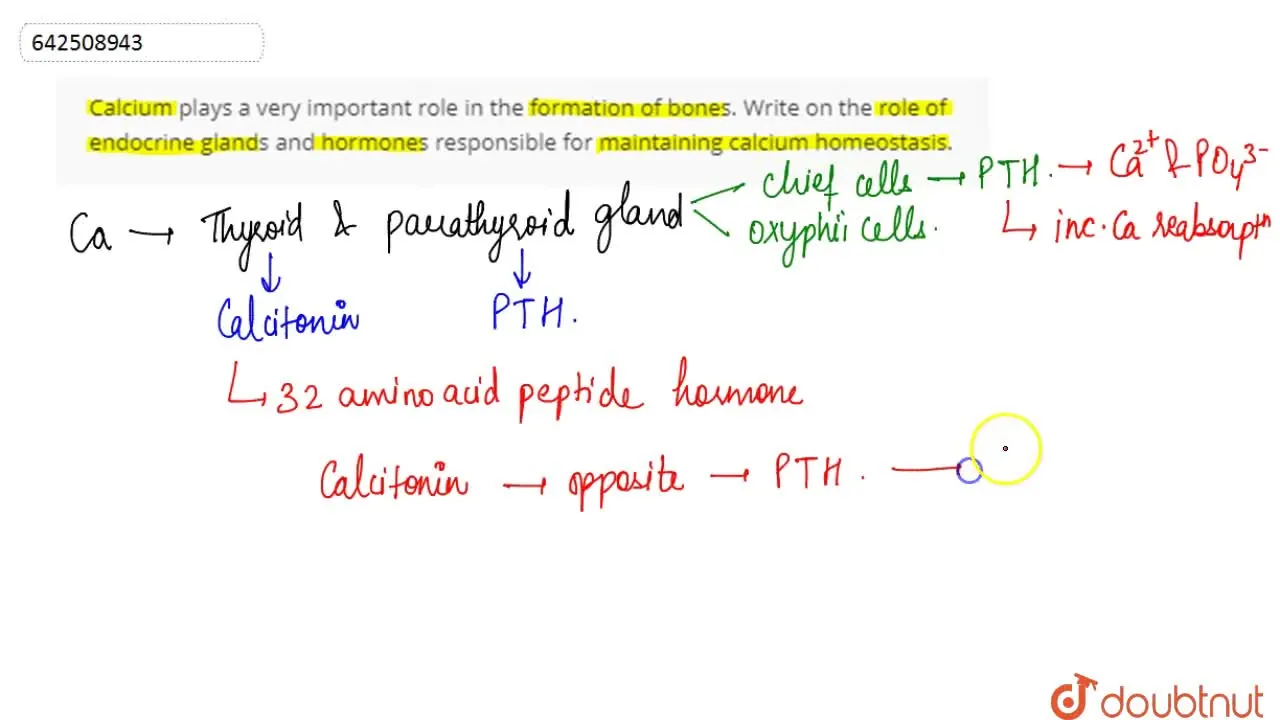Calcium plays a very important role in the formation of bones. Write on the role of endocrine glands and hormones responsible for maintaining calcium homeostasis.
Video Solution
Text Solution
The endocrine glands and hormones that are responsible for maintaining calcium homeostasis, are thyroid and parathyroid glands and their associated hormones are caicitonin and Parathyroid Hormone (PTH).
(i) Parathyroid glands are the glands developed from the endoderm of the embryo. The cells of parathyroid glands are of two types, i.e., chief cells and oxyphii cells. The chief cells of the parathyroid glands secrete parathyroid hormone (PTH).
This hormone (PTH) is involved in regulating calcium and phosphate balance between the blood and other tissue. It mobilises the release of calcium into the blood from bones. PTH increases calcium reabsorption by the body organs iike intestine and kidneys.
(ii) Thyroid gland is the largest endocrine gland located anterior to the thyroid cartilage 0f the larynx in the neck. This gland plays a vital role in maintaining calcium homeostasis. it releases thyrocaicitonin hormone produced by the parafoilicuiar cells, also called ‘0’ cells.
This hormone is secreted when the calcium level in blood gets high. it is a 32 amino acid peptide hormone that lowers the calcium level by suppressing release of calcium ions from the bones. Thus, caicitonin has an action opposite to that of the parathyrond hormone on calcium homeostasis.

|
Updated on:21/07/2023
Related Playlists
- BOOK - NCERT EXEMPLAR ENGLISHCHAPTER - CHEMICAL COORDINATION AND INTEGRATIONEXERCISE - Very short Answer Questions19videos
CHEMICAL COORDINATION AND INTEGRATION
- BOOK - NCERT EXEMPLAR ENGLISHCHAPTER - CELL CYCLE AND CELL DIVISIONEXERCISE - Long Answer type question6videos
CELL CYCLE AND CELL DIVISION
- BOOK - NCERT EXEMPLAR ENGLISHCHAPTER - DIGESTION AND ABSORPTION EXERCISE - Long Answer Type Questions5videos
DIGESTION AND ABSORPTION
Similar Questions
Name a bacterium used as a clot buster. Also mention the enzyme.
View SolutionDiaphragm plays an important role in
View SolutionMitochondria play a very important role in :
View SolutionPredator play important role in
View SolutionThymosin plays an important role in differentiation of
View Solution____ play an important role in blood clotting
View SolutionAlary muscles play an important role in
View SolutionFactors which play significant role in the formation of major biomes are
View SolutionComment on the role of placenta as an endocrine gland.
View SolutionChemical acrasin play an important role in formation of _______in some slime moulds.
View Solution


